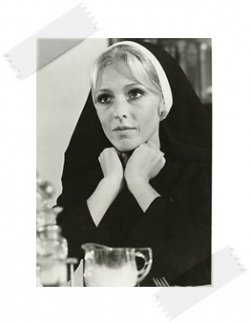
WEEKEND NUN
US, 1972, 78 minutes, Colour.
Joanna Pettet, Vic Morrow, Ann Sothern, Anne Francis, Kay Lenz, James Gregory, Beverley Garland.
Directed by Jeannot Swarcz.
An above average telemovie. It was made in 1972 at a time of reform within the Catholic Church especially as regards religious orders and nuns were experimenting with social work. The film is critical in its presentation of the dichotomy between the nun at work in the social needs of California and life in the convent.
However, these were the problems of the time and they continued throughout the seventies. Some nuns did leave their convents, others contributed to a change in the religious congregation. The film looks like an alternative version of The Nun's Story rather than The Bells Of St. Mary's which is alluded to. However. the screenplay is much more plausible and echoes more realistically the atmosphere of the times.
Joanna Pettit is excellent in the central role which is based on a real story of a nun worker called Joyce Duco (who eventually left her Congregation). There is good support from Vic Morrow, more sympathetic even though tough, James Gregory and Kay Lenz in an early role. Joanna Pettit combines the naivety of the convent trained woman with the earnestness of someone who wants to do well for people. While the running time of the film is short, it contains a great deal and is well worth reflecting on. Direction is by Jeannot Swarcz, director of many telemovies and such feature films as Jaws Two.
1. The immediate impact of the film? entertainment, message film? On reflection afterwards? Its reflection of nuns in the seventies and their trying to find their identity, understand their role in the apostolate, religious congregations and their traditions? The real story of Joyce Duco? The purpose of the film - to show the situation, to make a judgment on it?
2. The tradition of nuns on the screen? The sentimental films, the Ingrid Bergman heroine films, The Nun's Story? How well did the film fit in with the traditions, change them? The picture of experimentation, genuine religious vocation, prayer? Social work? the nuns' naivety and yet coping with real life problems? The moving out from an enclosed world? The contrast with the attitudes of the enclosed nuns - and their harshness of judgment? The film's judgment on Sister Damien's behaviour, decisions?
3. The impact of the film as a telemovie: its brevity, melodramatic situations, dramatic presentation of characters, issues and persons?
4. The introduction: Sister Damien in habit, her name, her change of dress, being known as Miss Marjorie Walker? The change of personality witli the change of dress? People not wanting her to be known as a nun - because of people's reaction? The greater freedom as Miss Walker, femininity? People's reactions to nuns, expectations and presuppositions?
5. The picture of convent life - the Superior and her motherliness and severity? The other sisters and their seeming lack of interest in Sister Damien's work? Meals, regulations, prayer, community singing, the doors of the convent being opened and shut? What was Marjorie leaving when she left the convent? Would she contribute to the changing style of her congregation?
6. The picture of the social work - Mr Hutchinson and his advice, friendship and support? Chuck and his severity, his passes, making dates, being hard in his judgments and criticisms, the training for self-defence? His treatment of Audrey especially in the morgue? His chasing her at the end and his participation in her death? The walk along the beach and his comments on Marjorie's being a nun? His statements on being single-minded in the job? His own experience? A professional? Seeing him in action, the difference between his approach and Marjorie’s?
7. Marjorie’s naivety and yet her learning? The discussions about clients conning the social workers? Her going into the strip joint and getting, the girl out, her having a knife? The encounter with Audrey and her talk? The visit to Audrey's mother and the truth from the boy friend? Drugs, pregnancy, attempted suicide? The effect on her especially for going to confession, needing a retreat? The boy and his neurotic mother and his pushing her down the stairs? Pictures of some of her success?
8. Marjorie's initial naivete but tier capacity to learn? Her background as a teacher, her fears and apprehension, her
growing stronger? Combining religious life with her work? Her reaction to Chuck's criticism, her experience for example Audrey's mother's boy friend and the truth? The experience in the morgue? the importance of her going to confession and being advised to stay with the job? Her prayer? The film's showing her having difficulty with her vows - with obedience rattier than with celibacy? Her reaction to the Superior after the incident with Audrey's attempted suicide? The importance of Audrey's trying to find her, her death? her walking down the street and her decision to take time off?
9. The picture of social needs and audience response to the needs? The need for nuns? The role of a convent in the modern world? Marj's final decision? how credible? The possibility of return, not returning?
10. The impact of the telemovie for a popular audience and raising issues not likely to be familiar to the wider audience?